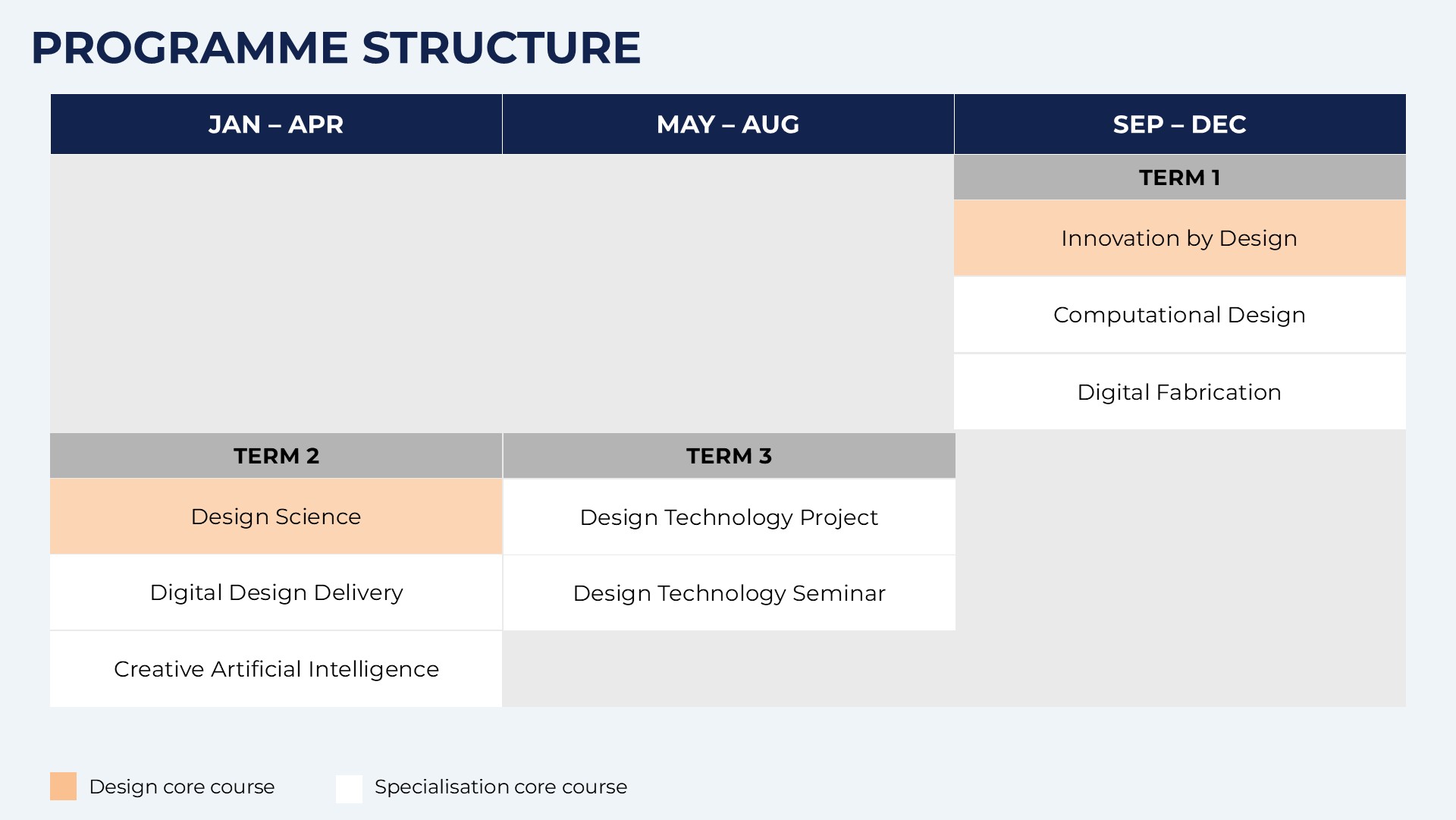Master of Science in Technology and Design (Architectural Design Computation)
Master of Science in Technology and Design (Architectural Design Computation)
Programme schedule
The MTD (Architectural Design Computation) is a one-year full-time coursework-based Master programme. It comprises eight courses (96 credits)—two core design courses and six specialised courses, organised as follows:

Course descriptions
Innovation by Design (12 credit points)
A design core module for the MTD programmes, the focus of this course is the integration of marketing, design, engineering and manufacturing functions in creating and developing a new product, system or service. The course will go through the different phases of designing a new product, system or service using the four Ds of the four-phase Design Innovation Cycle of “Discover-Define-Develop-Deliver”. The course will focus on some of the critical success factors for new product development, with an early emphasis on design thinking. Students will be given a design challenge to complete.
Computational Design (12 credit points)
This course is an introduction to concepts and methods, as well as practical techniques in design computation. It is comprised of three learning segments: (a) computational geometry; (b) principles of algorithmic design; and (c) advanced parametric modelling. Students will gain experience in geometric modelling, visual programming, and developing computer programs through a series of active learning sessions and exercises.
Digital Fabrication (12 credit points)
Digital fabrication investigates the transformation of concept design to manufacturing within contemporary digital media. Situated at the threshold between virtual and physical, design information and artifacts, it is comprised of both design computation methods as well as material fabrication techniques. The course introduces advanced methods and skills in computer-aided design and manufacturing and design materialisation technologies spanning from conventional fabrication to computer numerical control manufacturing, 3D printing and industrial robotics.
Design Science (12 credit points)
This course introduces students to design science where many design principles and methods will be reviewed, applied and analysed. Students will learn to make connections between design science and other fields, such as engineering, and how principles in design science can be used to advance these fields. The class will cover a broad set of design methods such as customer needs analysis, methods in creativity, functional modelling, design for X and design for testing and verification.
Digital Design Delivery (12 credit points)
This subject is designed to provide students with advanced knowledge and practical skills of the planning and execution of project delivery within digital technologies. It is aimed to offer opportunities to establish an understanding of the factors that impact the generation of Building Information Models (BIM), including methods of communication/collaboration, procedural BIM data generation, exchange between trades of the built environment, qualitative and quantitative introspection and analysis of models.
Creative Artificial Intelligence (12 credit points)
The course provides an up-to-date approach to the rapidly evolving new field of designing with Artificial Intelligence (AI). It also speculates on the ways in which the design process itself might be radically augmented and reimagined as a result of this recent epistemological shift towards a ‘Software 2.0’ paradigm. By situating the course within an experimental prototyping context, students will not only gain the practical experience of using / fine-tuning / training / evaluating / deploying deep learning models in relation to specific design workflows, but also the design sensibility to conceptualise, reason, visualise, articulate, and implement their creative design applications with state-of-the-art AI models.
Design Technology Project (18 credit points)
The design technology thesis project offers the opportunity to conceptualise, develop and demonstrate novel ideas for real-world challenges based on the new knowledge and skills acquired over the course of the programme. The topic of the thesis project will be coordinated with the thesis advisor and industry partners. The objective of the thesis project is to showcase creativity and technical excellence by the completion of the MTD programme in design computation.
Design Technology Seminar (6 credit points)
The subject complements the design technology project via a lecture series comprised of current challenges in the industry / design practice as well as cutting-edge topics currently being actively researched in academia. The objective is to offer a broader awareness of current challenges and opportunities and a source of inspiration for the design technology project. Technology leaders from the industry and academic principal investigators will offer guest lectures presenting their most current work and discuss about the future of technology in the design world.
